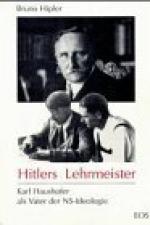|
This section contains 377 words (approx. 2 pages at 300 words per page) |
Encyclopedia of World Biography on Karl Haushofer
Karl Haushofer (1869-1946) was a German professional soldier who, on his retirement at the age of 50, became a geopolitician whose views were influential in Germany especially under the Hitler regime, from 1933 to 1945.
Born in Munich on Aug. 27, 1869, Karl Haushofer belonged to a family of artists and scholars and on his graduation from the Munich Gymnasium (high school) contemplated an academic career. However, service with the Bavarian army proved so interesting that he stayed to work, most successfully, as an instructor in military academies and on the general staff. He fought in World War I and in 1919 retired with the rank of major general.
The cultivated atmosphere of his childhood gave Haushofer an outlet for retirement. He had visited Japan on a military mission in 1908 and traveled extensively in Asia; in 1911 he had received a doctorate of philosophy from Munich University for a thesis on Japan. Joining the staff of Munich University in 1921, he quickly became, as the major general-professor-doctor, a respected figure.
A New View of Geopolitics
In 1924 Haushofer published a book on the geopolitics of the Pacific Ocean and, with a group of young geographers and social scientists, founded the Zeitschrift für Geopolitik, conceived as political geography with a dynamic purpose. This gave many Germans what they wanted, a Weltanschauung, meaning a view of the world, a philosophy, a sense of purpose, a living faith. Haushofer appealed to the heroic virtues of discipline and obedience. Aristocratic in origin and temperament, he believed that the army could be the abiding power in Germany.
For a long time his attitude to the Nazi domination from 1933 was cautious. Prophesying that the Soviet Union was potentially a greater power than the United States, he wished to see a German-Soviet alliance, with Japan in friendly association. In Haushofer's view, the days of France and England were finished, and the future lay with the resurgent nations, Germany, Italy, and Japan. His views were expressed in books and numerous articles.
Though Haushofer was an adviser to Hitler, his last years were bitter, for his son Albrecht, professor of political geography and geopolitics at Berlin University, was murdered by National Socialist agents. Haushofer's hopes for Germany perished, and with his wife he died by suicide on March 13, 1946, at Paehl bei Weilheim.
|
This section contains 377 words (approx. 2 pages at 300 words per page) |


